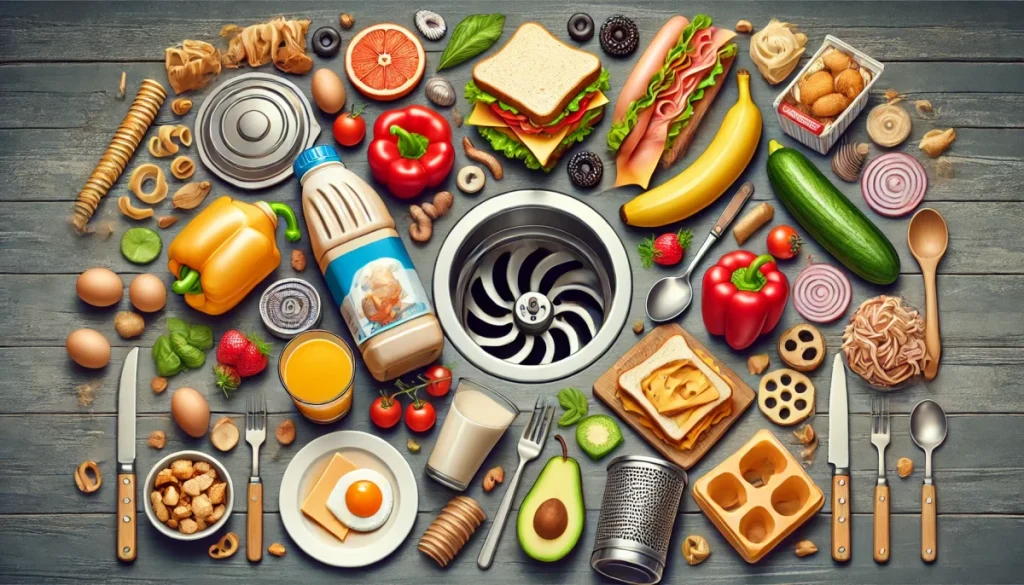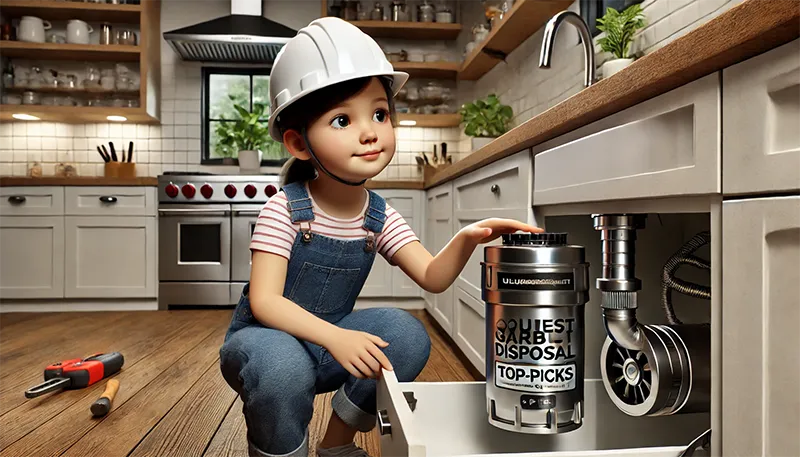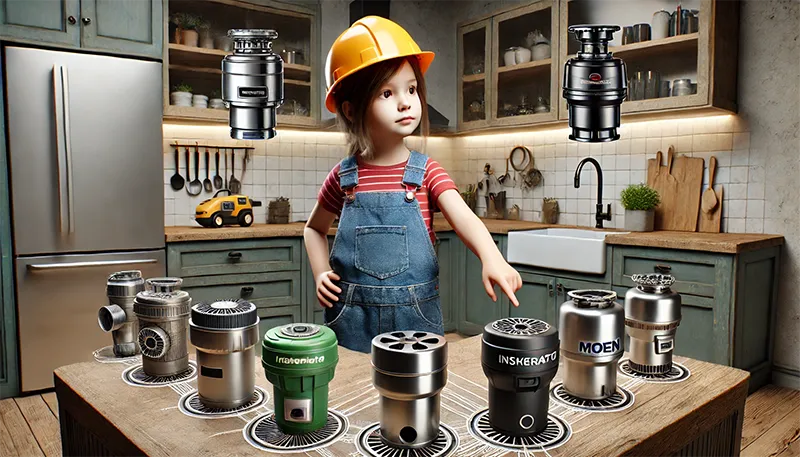Garbage disposals are incredibly convenient for getting rid of food waste quickly. However, not all foods are safe to put in your disposal, and improper use can lead to clogs, jams, or even permanent damage to the appliance. Knowing which foods you should never put in your garbage disposal is key to maintaining a functioning kitchen and avoiding costly repairs.
Some foods can wreak havoc on the disposal blades, while others may cause blockages in your plumbing. In this article, we’ll highlight the top 10 foods to avoid, explain why they can cause problems, and provide tips on proper waste disposal methods. By following these guidelines, you can keep your disposal running smoothly and extend its lifespan.
Grease, Fats, and Oils
One of the worst things you can put down your garbage disposal is grease, fats, and oils. While these substances may seem harmless when they’re hot and liquid, they quickly become a major issue once they cool down. Grease and fats solidify as they cool, which can cause them to stick to the pipes and form clogs. This buildup can lead to slow draining or even a complete blockage in your plumbing system, making grease one of the primary foods you should never put in your garbage disposal.
Additionally, fats and oils can coat the disposal’s blades, making them less effective at grinding up food. Over time, this can reduce the overall efficiency of your garbage disposal and increase the likelihood of jams. The sticky residue left by grease also attracts food particles, causing an even bigger clogging issue.
To dispose of grease properly, it’s best to let it cool and solidify in a container, such as an old can or jar. Once it has hardened, you can throw it in the trash. For small amounts of grease left in pans after cooking, use a paper towel to wipe out the excess before washing the pan. This simple step can save you from major plumbing problems down the road.
It’s important to remember that even small amounts of grease can cause issues, so always avoid pouring any grease, fats, or oils down the drain. Keeping these substances out of your garbage disposal will help prevent clogs and keep your kitchen running smoothly.
Fibrous Vegetables (Celery, Corn Husks, Asparagus)
Fibrous vegetables like celery, corn husks, and asparagus can cause significant problems when put down the garbage disposal. These vegetables have long, stringy fibers that can wrap around the disposal blades, leading to jams or even motor burnout. This makes fibrous vegetables one of the top foods you should never put in your garbage disposal if you want to avoid unnecessary repairs.
When fibrous vegetables get stuck in the disposal, they can stop the blades from spinning properly, causing the motor to strain as it tries to process the food. This added stress on the motor can lead to overheating or even permanent damage if the issue isn’t addressed quickly. Even if the disposal seems to be working fine at first, over time, these stringy fibers can accumulate and cause more serious problems.
It’s also important to note that these fibers can extend into your plumbing system, where they may become tangled or caught in the pipes. This can result in clogs that are difficult to remove, potentially requiring professional help to fix.
Instead of using the garbage disposal for fibrous vegetables, it’s better to dispose of them in the trash or compost. Many of these items, like corn husks and asparagus stalks, break down well in a compost bin, where they can be turned into nutrient-rich soil for your garden.
By keeping fibrous vegetables out of your garbage disposal, you’ll prevent jams and prolong the life of the appliance. Composting these items is an environmentally friendly alternative that also keeps your kitchen functioning smoothly.
Coffee Grounds
While many people believe that coffee grounds are harmless in a garbage disposal, they can actually cause significant problems. Coffee grounds may seem fine in small amounts, but over time, they can accumulate in the pipes and create a thick sludge. This buildup can lead to slow drainage and stubborn clogs, making coffee grounds one of the foods you should never put in your garbage disposal.
The fine, granular nature of coffee grounds makes them particularly tricky for garbage disposals. Rather than being flushed through the pipes, they tend to settle and compact, especially in areas where there are bends in the plumbing. Once the grounds start building up, they can create a blockage that restricts water flow, eventually leading to a complete clog.
In addition to clogging pipes, coffee grounds can also absorb oils and fats that may already be present in your plumbing, making clogs even worse. This combination of thick, greasy sludge is difficult to remove and may require professional plumbing services to clear.
Instead of dumping coffee grounds into the garbage disposal, consider using them in your compost. Coffee grounds are rich in nitrogen and make an excellent addition to a compost bin, where they can help balance the carbon-to-nitrogen ratio. You can also use coffee grounds as a natural fertilizer for your garden or sprinkle them around plants to help deter pests.
By keeping coffee grounds out of your garbage disposal, you’ll avoid clogs and keep your kitchen plumbing in good working order. Composting is a far better option and allows you to reuse your coffee grounds in an environmentally friendly way.
Eggshells
There’s a common myth that eggshells can sharpen garbage disposal blades, but this couldn’t be further from the truth. In reality, eggshells can cause more harm than good when put down the disposal, which is why they’re on the list of foods you should never put in your garbage disposal.
The problem with eggshells is twofold. First, the thin, papery membrane inside the eggshell can easily wrap around the disposal blades, leading to jams or reduced performance. These membranes are tough for the disposal to break down and can tangle with other debris in the unit, causing the motor to strain.
Second, the eggshell fragments themselves can contribute to clogs further down the plumbing system. Once the eggshells are ground up, the tiny pieces don’t always flush through the pipes properly. Instead, they can settle in the pipes and create blockages, particularly when combined with other debris like grease or coffee grounds.
Instead of putting eggshells in the garbage disposal, consider composting them. Eggshells are rich in calcium and other nutrients, making them a great addition to a compost bin. If you don’t compost, simply throw the eggshells in the trash.
By keeping eggshells out of your disposal, you’ll avoid unnecessary jams and clogs. Stick to composting or throwing them away to protect your disposal from damage.
Pasta, Rice, and Other Starchy Foods
Pasta, rice, and other starchy foods may seem harmless, but they can cause major problems in your garbage disposal. These items are notorious for expanding when exposed to water, and once they swell up, they can create a sticky, glue-like paste that clogs pipes. This makes pasta and rice some of the top foods you should never put in your garbage disposal.
The problem with starchy foods is that they absorb water and continue to expand, even after being ground up by the disposal. Once these foods reach the pipes, they can stick to the sides, slowing down drainage or blocking the flow of water altogether. Over time, the buildup of pasta or rice can create a thick paste that’s difficult to remove and may require professional plumbing services to fix.
In addition to expanding in the pipes, starchy foods can also wrap around the blades of the garbage disposal, causing them to jam or work less efficiently. This can put unnecessary strain on the motor and increase the likelihood of a breakdown.
Instead of using the garbage disposal for pasta, rice, or other starchy foods, it’s best to throw them in the trash. If you have small amounts left over on your plate, wipe the food into the trash before washing the dishes. This simple step can prevent clogs and keep your disposal functioning properly.
By avoiding pasta, rice, and other starchy foods in your garbage disposal, you’ll prevent sticky blockages and ensure that your plumbing system remains clear.
Fruit Pits and Hard Seeds
Fruit pits and hard seeds, such as those from avocados, peaches, and cherries, are much too hard for your garbage disposal to handle. These items are extremely tough and can cause serious damage to the blades, making them one of the top foods you should never put in your garbage disposal.
When fruit pits get into the disposal, they can jam the blades, causing the motor to overheat as it struggles to grind the pit. In some cases, the disposal may stop working altogether, requiring repairs or even replacement. Additionally, hard pits can dull the blades over time, reducing the overall efficiency of the disposal.
Even if the disposal manages to grind up a fruit pit, the hard fragments can become lodged in the pipes, leading to clogs. These tiny pieces are often difficult to flush out and may cause blockages that prevent water from draining properly.
The best way to dispose of fruit pits is to throw them in the trash or compost them if possible. While they take longer to break down than other organic materials, fruit pits can eventually decompose in a compost bin. Just be sure to avoid putting them in your garbage disposal to prevent damage.
By keeping fruit pits and hard seeds out of your garbage disposal, you’ll avoid blade damage and prevent clogs in your pipes. Always throw these tough items in the trash to protect your disposal from unnecessary wear and tear.
Potato Peels
Potato peels are another common food item that can cause significant problems in your garbage disposal. The starch
in potato peels turns into a thick, sticky paste when exposed to water, making it one of the worst foods you should never put in your garbage disposal.
When potato peels are ground up in the disposal, the starchy material can stick to the blades and reduce their effectiveness. Over time, this sticky residue can build up in the pipes, creating blockages that slow down drainage or cause complete clogs. Potato peels can also wrap around the blades, causing jams and putting strain on the motor.
The best way to dispose of potato peels is by composting them. Potato peels break down well in compost and can add valuable nutrients to the soil. If composting isn’t an option, simply throw them in the trash instead of using the garbage disposal.
By keeping potato peels out of your garbage disposal, you’ll prevent sticky blockages and help the disposal run more efficiently. Composting is a great way to reuse these scraps, but if you can’t compost, throwing them away is the safest option.
Bones and Shells
Bones and seafood shells are far too hard for a garbage disposal to handle. These items can easily break or dull the disposal blades, making them one of the top foods you should never put in your garbage disposal.
Bones, in particular, are extremely tough and can cause significant damage to the disposal’s internal components. When the disposal tries to grind up bones, the blades can become stuck or jammed, causing the motor to overheat. In some cases, bones can even cause the disposal to break down completely, requiring expensive repairs or replacement.
Seafood shells, like those from shrimp or lobster, are also problematic. They are sharp and hard, which can damage the blades or get stuck in the unit. Once they’re in the pipes, shells can lead to clogs that block water flow and cause drainage issues.
Instead of using the garbage disposal for bones and shells, throw them in the trash. These items are too tough for the disposal to handle, and putting them down the drain can result in costly repairs.
By avoiding bones and shells in your garbage disposal, you’ll protect the blades and motor from damage. Always throw these hard items away to keep your disposal running smoothly.
Onion Skins
Onion skins may seem harmless, but they can cause serious issues when put in the garbage disposal. The thin, papery layers of onion skin can easily wrap around the blades and cause jams, making them one of the foods you should never put in your garbage disposal.
When onion skins are ground up, they don’t break down like other food items. Instead, they form thin layers that can block drainage and cause water to back up in the sink. Additionally, the skins can get caught in the disposal’s motor, leading to jams or reduced efficiency.
If you want to avoid these problems, it’s best to throw onion skins in the trash or compost them. Onion skins break down well in compost and can add valuable nutrients to the soil. Just be sure to keep them out of the disposal to prevent jams and drainage issues.
By keeping onion skins out of your garbage disposal, you’ll avoid unnecessary jams and keep the unit running efficiently. Composting is a great way to dispose of these scraps, but throwing them in the trash works just as well.
Non-Food Items (Paper, Plastic, Metal)
Finally, non-food items like paper, plastic, and metal should never go in your garbage disposal. These items are not designed to be processed by the disposal and can cause serious damage to the blades and motor. Non-food items are the most obvious foods you should never put in your garbage disposal, but accidental items sometimes get tossed down the drain.
Paper, plastic, and metal can jam the blades and cause the motor to overheat. Even small pieces of these materials can get stuck in the unit, leading to expensive repairs. Additionally, non-food items can damage the plumbing system and cause clogs that are difficult to remove.
If you accidentally drop a non-food item into the disposal, turn the unit off immediately and carefully remove the item with pliers or tongs. Never try to fish it out with your hands while the disposal is on, as this can lead to serious injury.
The best way to dispose of non-food items is by recycling them or throwing them in the trash. Keeping paper, plastic, and metal out of your garbage disposal will help protect the unit from damage and keep your kitchen plumbing running smoothly.
Conclusion
Knowing which foods you should never put in your garbage disposal is essential for keeping your kitchen running smoothly and avoiding costly repairs. By avoiding problematic items like grease, fibrous vegetables, coffee grounds, and hard materials, you’ll prevent clogs, jams, and damage to the disposal. Regular maintenance and mindful disposal habits can extend the life of your appliance and keep your plumbing clear.
Follow these simple guidelines to protect your garbage disposal and save yourself from the frustration of a clogged or broken unit. Proper disposal practices will ensure that your garbage disposal continues to function efficiently for years to come.



